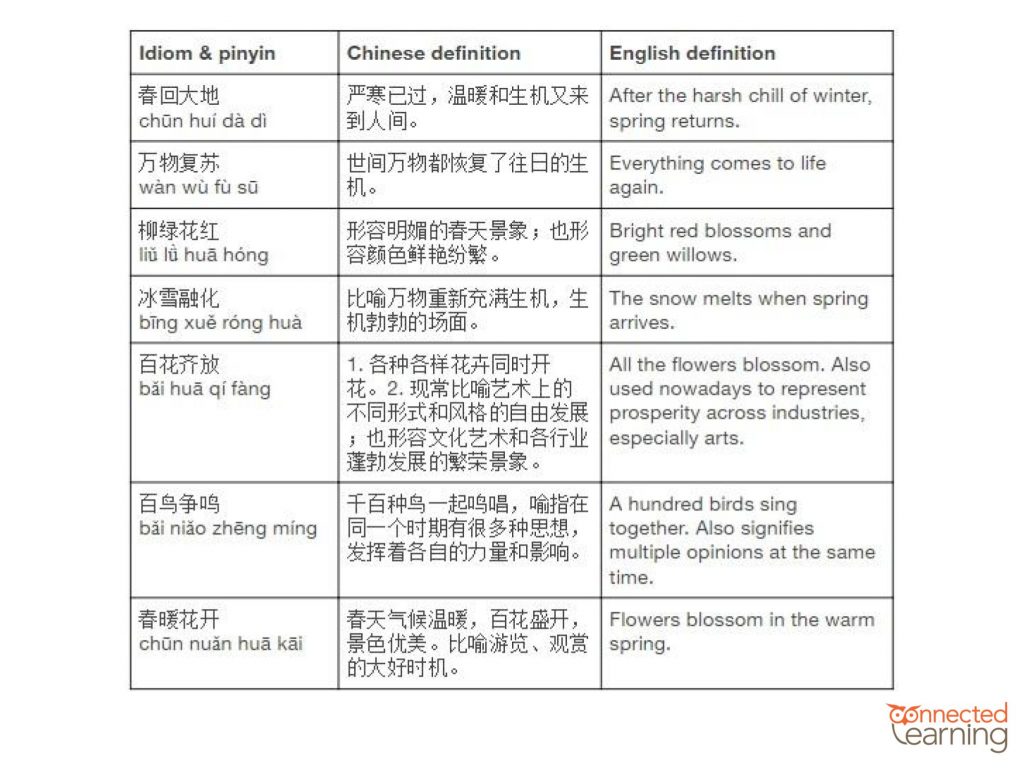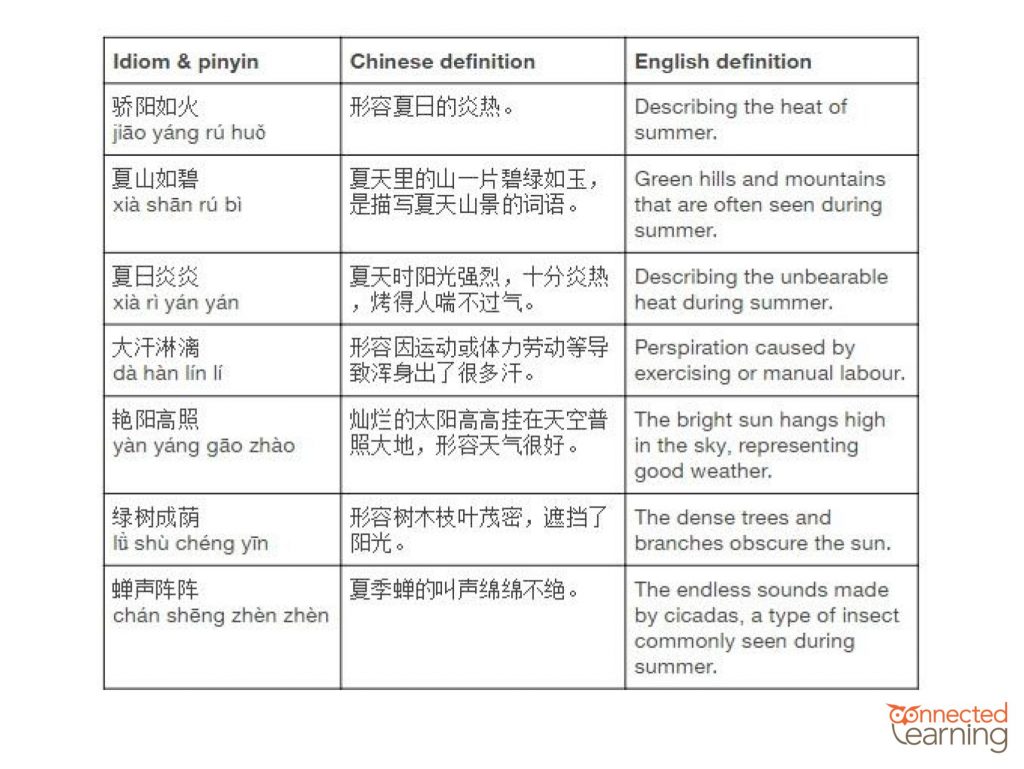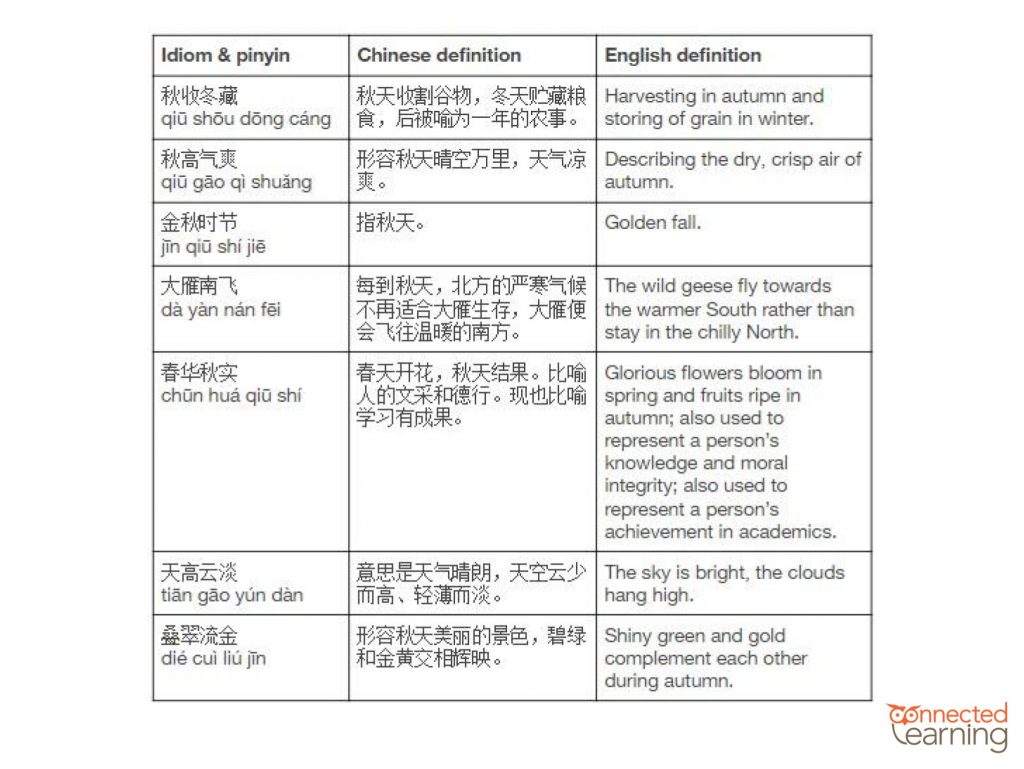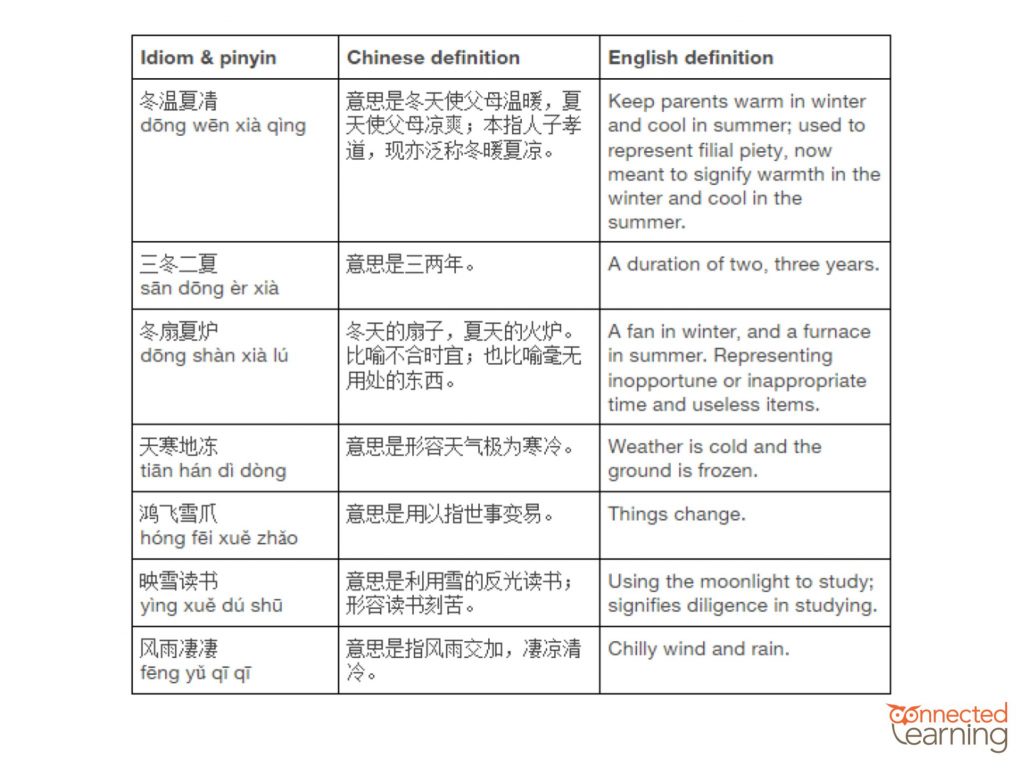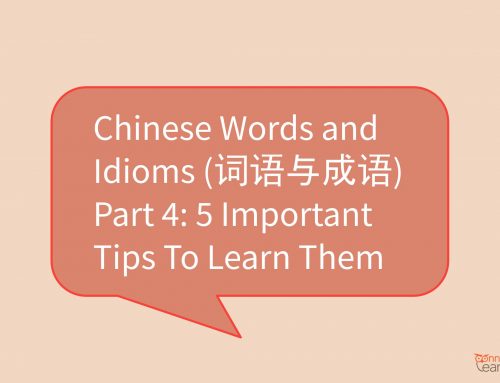Are you here because you need some guidance on Chinese idioms?
Perhaps not for you, but for your young learners at home.
No matter how strong their foundation of the language is, the chances that they’ll know a large number of idioms backwards and forwards are pretty slim.
In last month’s blog post, we talked about how building a powerful vocabulary library is essential to learn Chinese effortlessly.
Up to this point, you should know that the extensiveness of the Chinese language might be beyond your grasp. But the best is yet to come.
IMPROVE COMPREHENSION, LISTENING, SPEAKING, COMPOSITION WRITING AND SPELLING [EVERYTHING TO KNOW]
This time, we show you even more phrases and idioms that students can confidently apply to their writing.
Idiomatic phrases (成语) about numbers
Numbers are somewhat prevalent when it comes to Chinese phrases and terms. The best part about them? They’re comparably easier to memorise, understand and apply. The following are just some to spark inspiration.
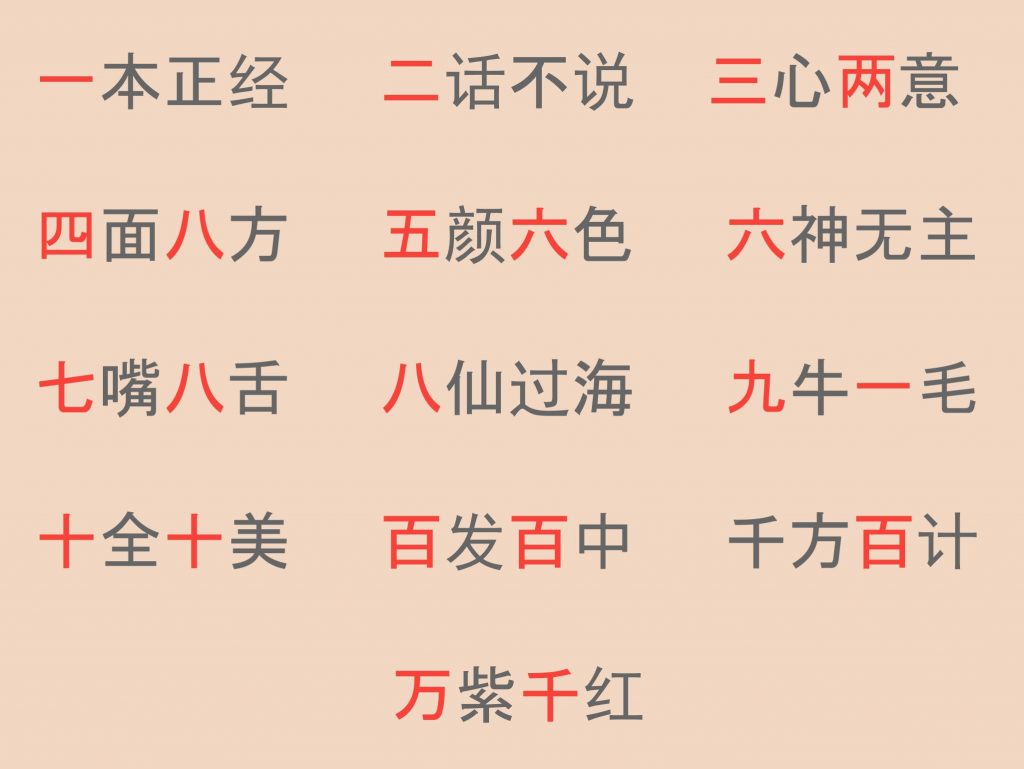
一本正经、二话不睡、三心两意、四面八方、五颜六色、六神无主、七嘴八舌、八仙过海、九牛一毛、十全十美、百发百中、千方百计、万紫千红
Idiomatic phrases with eight Chinese characters
Every language has its own complex expressions, and in Chinese, it’s represented by eight-character idioms. The library for Chinese phrases is infamously sizeable, but you’ll be wowing readers in no time with these phrases:
千里之行,始于足下 qiān lǐ zhī háng, shǐ yú zú xià
A journey of a thousand miles begins with a single step.
事情是从头做起,从点滴的小事做起,逐步进行。
百尺竿头,更进一步 bǎi chǐ gān tóu, gèng jìn yī bù
Make further progress by working hard even after excelling academically.
指学问、成绩等达到很高程度后继续努力,争取更大进步 。
耳听为虚,眼见为实 ěr tīng wéi xū, yǎn jiàn wéi shí
Don’t believe what others tell you unless you’ve seen it for yourself.
形容不要轻信传闻,看到的才是事实。听来的传闻是靠不住的,亲眼看到才算是真实的。谓亲眼看见的比听说的要真实可靠。
人无完人,金无足赤 rén wú wán rén, jīn wú zú chì
Gold can’t be pure, thus a man can’t be perfect.
没有十全十美的事物。也指不能要求一个人没有一点缺点、错误。
尺有所短,寸有所长 chǐ yǒu suǒ duǎn, cùn yǒu suǒ zhǎng
Everything has its advantages and disadvantages.
比喻各有长处,也各有短处,彼此都有可取之处。
一叶障目,不见泰山 yī yè zhàng mù, bú jiàn tài shān
Unable to see a vision; figuratively used to describe narrow-mindedness.
比喻为局部现象所迷惑,看不到全局的整体,也比喻目光短浅。
Well-known phrases related to famous Chinese stories and historical events (成语故事)
Since young, you’d have probably seen, read or watched plenty of stories explaining famous 4-character phrases.
One of the reasons why the Chinese language is so profound and captivating is because most Chinese idioms are deeply rooted in traditional culture.
Using them appropriately gives depth to the writing.
闻鸡起舞 wén jī qǐ wǔ
To start practising at the first crow of the cock (idiom); to be diligent in one’s studies.
听到鸡叫就起来舞剑;后比喻有志报国的人及时奋起。
The story: In the Jin Dynasty (265-420)《晋书·祖逖传》, there was a man called Zu Ti (祖逖). He and his close friend Liu Kun (刘琨) shared the same lofty goal to rejuvenate the Jin Dynasty. Once, Zu Ti heard a cock crow in his dream at midnight. He then told Liu Kun, “From now on, why don’t we get up to practice the sword the moment we hear the cock crow?” Liu Kun agreed readily. Day by day and year in, year out, they never stopped. Through long periods of hard work, they finally achieved their ideals.
惊弓之鸟 jīng gōng zhī niǎo
Figuratively used to describe somebody who frightens easily, due to past experiences.
被弓箭吓怕了的鸟不容易安定。比喻经过惊吓的人碰到一点动静就非常害怕。
The story: During the time of the Warring States (475-221 BC)《战国策· 楚策四》, Geng Ying (更赢) was a well-known archer with excellent shooting skills. One day he was with the King of Wei (魏王) as a flock of swan geese flew over their heads. With confidence, Geng Ying said to the king that he’d be able to bring down a bird with one shot. The King doubted it. Geng Ying then shot down a goose, which was low and slow in its flight, and sad in its cry. The king admired with bewilderment. Geng Ying then explained: “The bird was flying low and slow because it was already hurt; it was crying in a bitter tone because it had lost its companions. Because it was already hurt and sad at heart, so the twang of my strong bow startled it. Thus it fell down just as how a man will drop his chop-sticks at the sound of a thunder-stroke.”
画龙点睛 huà lóng diǎn jīng
Fig. to add the vital finishing touch; the crucial point that brings the subject to life; a few words to clinch the point
比喻写文章或讲话时,在关键处用几句话点明实质,使内容更加生动有力。
The story: During the Tang Dynasty, the famous Chinese painter Zhang Yan Yuan (张彦远) painted four dragons without eyes. When asked, he explained that with eyes they would fly away. Incredulous, his friends insisted on filling in the eyes. Sure enough, as soon as the painter added eyes to two of the dragons, they started flying away.
胸有成竹 xiōng yǒu chéng zhú
Having plans or designs ready in one’s mind before doing a certain job so that its success is guaranteed. It also means being calm and sober-minded in dealing with things.
比喻办事以前,已经有全面的设想和安排。
The story: In the Song Dynasty (宋朝), there was an artist whose name was Wen Tong (文同); he was famous for his bamboo paintings. He grew various bamboos everywhere around his house. He loved observing the growth of the bamboo no matter the weather or season. After a long time, the image under different seasons, weather conditions and moments were deeply imprinted in his mind. When he painted, various images of bamboo popped up in his mind.
纸上谈兵 zhǐ shàng tán bīng
Fig. A theoretical discussion that is worse than useless in practice; armchair strategist; idle theorizing.
指在纸面上谈论打仗;比喻空谈理论,不能解决实际问题;也比喻空谈不能成为现实。
The story: Since young, the general Zhao Kuo (赵括) of the Zhao Dynasty studied military strategy and tactics. But his knowledge remains on paper; he has never gone to the battlefield. When he became a general, he changed all military laws and appointed officers thoughtlessly. Consequently, Zhao Kuo’s army suffered a severe defeat in the famous Campaign of Changping (长平之战). Zhao Kuo himself died in the war and the Zhao Dynasty was unable to recover from the defeat.
Idioms (成语) derived from myths
Just like English or any other language, mythology has contributed to a considerable amount of words, phrases, and expressions.
For example, in English, there are about 150,000 that are derived from ancient Greek.
Interestingly, the word ‘idiom’ originated from the Greek word idiōma. Here are some phrases and idioms with a touch of myth.
盘古开天 pán gǔ kāi tiān
Used to describe the very beginning of a situation; creating something never before.在原本没有的基础上,经过人为的而创出的事物.
The story: Pangu draws a line between the sky and the earth and after he died, he transformed into the famous Five Sacred Mountains (Mount Tai, Mount Heng, Mount Hua, Mount Heng, Mount Song), the moon and the sun, his blood changed into the water in river and sea, his hair into the grass. In all, the universe and Pangu combine in one.
夸父追日 kuā fù zhuī rì
A trope of man’s determination and volition against nature.
比喻征服自然意志坚定、决心很大;也比喻不自量力。
The story: Kuafu raced the Sun and caught up with it, but he got really thirsty. He tried to look for water and eventually died of thirst.
女娲补天 nǚ wā bǔ tiān
Having the vigour and strength to fight and make changes.
形容改造天地的雄伟气魄和大无畏的斗争精神。
The story: Long time ago, it’s said that Nvwa created human beings out of soil and clay. One day the earth broke, and to save the human beings, Nvwa sacrificed herself by patching up the hole in the earth using her own body.
Chinese idioms inspired by seasons
Spring
Throughout literature, spring is commonly symbolic of invigoration, youth and new beginnings. So, Chinese chengyu (idioms) that are related to this season usually contain the earth, blooms and animals.
Summer
What do you think of when we mention summer? For us, we think about the sea, the sun, and the coconuts! Look at some of the idioms that are associated with the bright and sunny weather of this season.
Autumn
Crisp reddish leaves, slightly chill breeze, empty trees with shades of brown, red and yellow… One of the most beautiful seasons out of the four, Autumn typically has a romantic and sometimes melancholic mood to it.
Winter
These idioms will have a snowball effect on your Chinese language use. And they’re just the tip of the iceberg.
Idioms related to unity
同心协力、众志成城、万众一心、战无不胜
Idioms that depicts one’s strength to make up for one’s weakness
人外有人、天外有天、博采众长、多多益善
Idioms about studying
勤学好问、好学不倦、读书百遍、其义自见、博览群书、学而不厌、坚持不懈、业精于勤、聚精会神、废寝忘食、专心致志、竭尽全力
Is your child bad in Chinese vocabulary? Forming good sentences? Or need more improvements in their oral language skills?
Our online live lessons targets to brush up student’s comprehension, oral comprehension, listening comprehension, composition and spelling skills. And most importantly, to grow their interest in learning Chinese!
Click below to discover what our lessons can offer to help your child.



